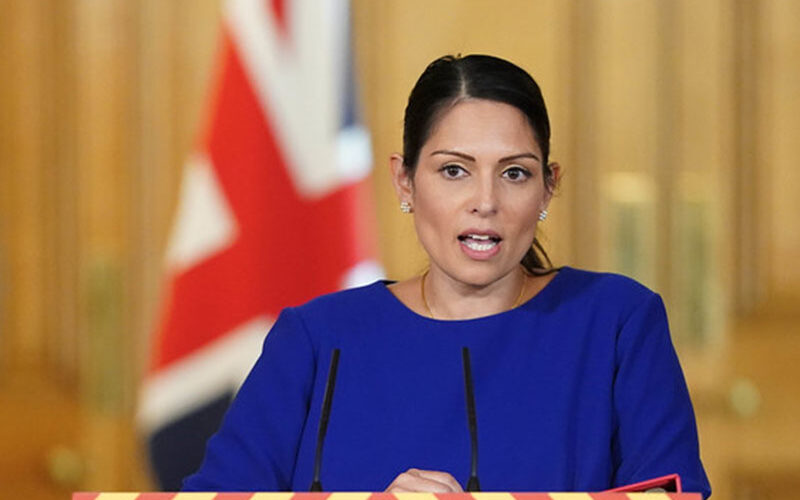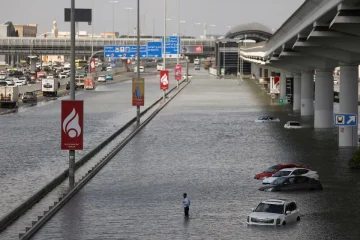ESTELLE SHIRBON
BRITAIN’S interior minister has pledged to reform what she described as a broken asylum system and to stop people arriving through illegal routes from making “endless legal claims to remain in our country”.
Home Secretary Priti Patel, who presents herself as tough on issues of law, order and immigration, has denounced as unacceptable a rise seen during the summer in the number of small boats carrying migrants across the Channel from France.
The numbers attempting the crossing, about 5,000 so far this year, are tiny compared with migrant flows in many other parts of the world, and human rights groups and political opponents have accused Patel of blowing up the issue for political gain.
“Our asylum system is fundamentally broken,” she told the ruling Conservative Party’s annual conference, which is taking place online due to the COVID-19 pandemic.
“I will introduce a new system that is firm and fair,” Patel said, promising a legislative overhaul next year.
Earlier, the Sunday Times reported that Patel’s plans would involve routinely denying asylum to migrants who came to Britain via illegal routes.
In her speech, Patel did not give details, but said it was not right that the way in which people entered Britain made no difference to how their asylum claim was treated.
Britain is a signatory to the international Refugee Convention, which is likely to limit the reach of Patel’s legislation. Under the U.N. Convention, asylum seekers cannot be prosecuted for irregular entry into a country of sanctuary.
Immigration has been an especially polarising issue in Britain since the Brexit referendum in 2016 because “taking back control” of immigration and border policy was presented as one of the key advantages by pro-Brexit campaigners.
The government has complained about the EU’s policies in this area and has said France should do more to stop Channel crossings. France says it has stopped large numbers of boats but cannot realistically stop them all.
France received 138,000 asylum applications last year, more than three times the 44,200 that were received by Britain, according to Eurostat.
The British government came under heavy criticism this week after newspapers reported it had studied housing asylum seekers on disused oil rigs, sending them to camps in Moldova or Papua New Guinea, or building floating sea walls to keep them out.
ESTELLE SHIRBON
BRITAIN’S interior minister has pledged to reform what she described as a broken asylum system and to stop people arriving through illegal routes from making “endless legal claims to remain in our country”.
Home Secretary Priti Patel, who presents herself as tough on issues of law, order and immigration, has denounced as unacceptable a rise seen during the summer in the number of small boats carrying migrants across the Channel from France.
The numbers attempting the crossing, about 5,000 so far this year, are tiny compared with migrant flows in many other parts of the world, and human rights groups and political opponents have accused Patel of blowing up the issue for political gain.
“Our asylum system is fundamentally broken,” she told the ruling Conservative Party’s annual conference, which is taking place online due to the COVID-19 pandemic.
“I will introduce a new system that is firm and fair,” Patel said, promising a legislative overhaul next year.
Earlier, the Sunday Times reported that Patel’s plans would involve routinely denying asylum to migrants who came to Britain via illegal routes.
In her speech, Patel did not give details, but said it was not right that the way in which people entered Britain made no difference to how their asylum claim was treated.
Britain is a signatory to the international Refugee Convention, which is likely to limit the reach of Patel’s legislation. Under the U.N. Convention, asylum seekers cannot be prosecuted for irregular entry into a country of sanctuary.
Immigration has been an especially polarising issue in Britain since the Brexit referendum in 2016 because “taking back control” of immigration and border policy was presented as one of the key advantages by pro-Brexit campaigners.
The government has complained about the EU’s policies in this area and has said France should do more to stop Channel crossings. France says it has stopped large numbers of boats but cannot realistically stop them all.
France received 138,000 asylum applications last year, more than three times the 44,200 that were received by Britain, according to Eurostat.
The British government came under heavy criticism this week after newspapers reported it had studied housing asylum seekers on disused oil rigs, sending them to camps in Moldova or Papua New Guinea, or building floating sea walls to keep them out.
Patel made no reference to any of those ideas in her speech. – Thomson Reuters Foundation.














